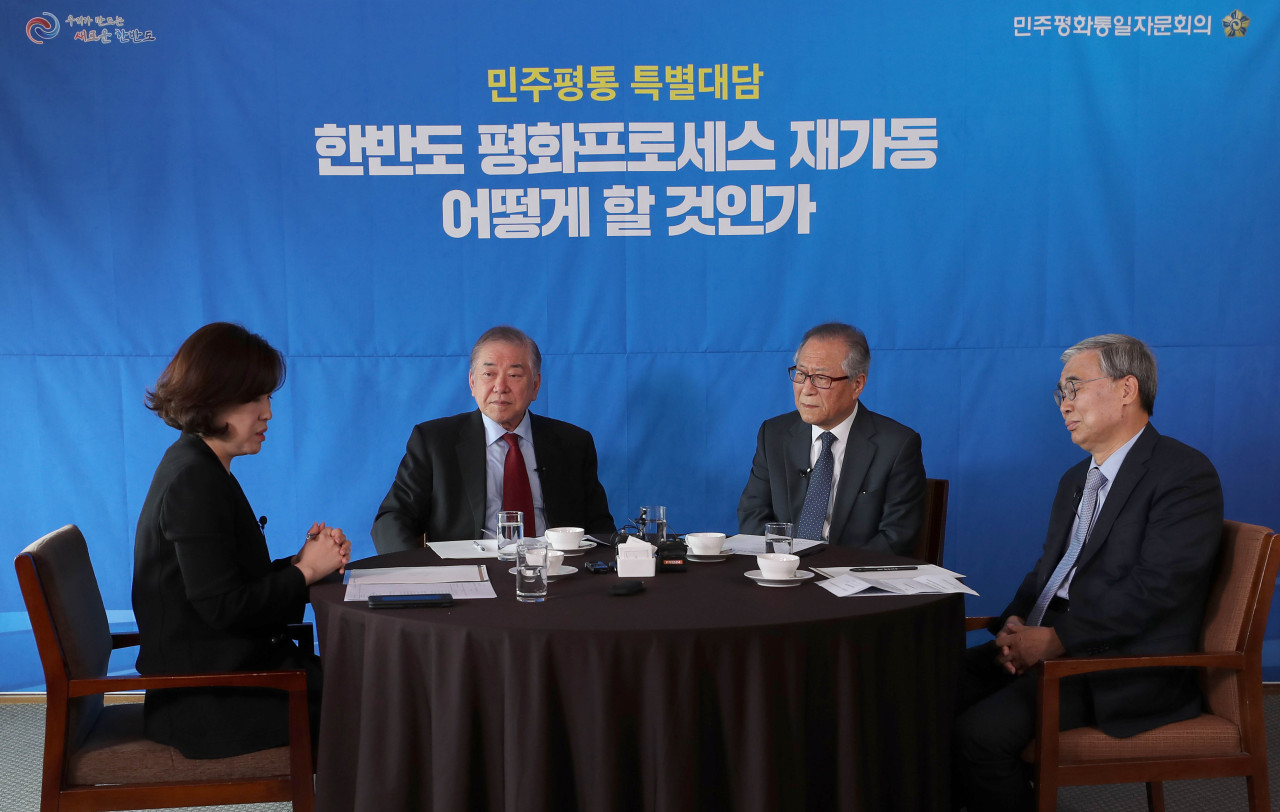 |
Moon Chung-in (second from left), the president‘s special adviser on foreign policy, Jeong Se-hyun (third from left), executive vice-chairperson of the National Unification Advisory Council, and Lee Jong-seok (right), a former unification minister, attend a roundtable on ways to restart the peace process for the Korean Peninsula at the Korea Press Center in Seoul on Monday. (Yonhap) |
Amid stalled relations between Seoul and Pyongyang, some experts assert that cross-border public health care cooperation could open up opportunities to resolve the impasse between the two Koreas, as both battle the novel coronavirus pandemic.
“North Korea has been pushing ahead with a policy of ‘self-reliance,’ but it would be difficult, especially as the country deals with COVID-19,” said Jeong Se-hyun, executive vice chair of the National Unification Advisory Council, in a panel discussion organized by the presidential council. “And that’s why I believe this occasion is the golden opportunity to reboot the Korean Peninsula peace process.”
“The government should start from public health cooperation and then open up the talks between the two leaders. The North will be anticipating a message from the South around April 27 (the anniversary of the inter-Korean summit). So we can’t miss the opportunity.”
While it is difficult to get a clear picture of the secluded regime’s COVID-19 spread in the country -- with the North claiming it has no virus cases -- experts say the country has been putting health care and the medical industry at the top of the agenda, putting strenuous efforts into the construction of Pyongyang General Hospital.
“The most important decision from the latest Politburo meeting is to establish a national emergency quarantine system, meaning the country’s priority agenda is health care,” said Lee Jong-seok, formerly unification minister. “If Seoul can come up with fresh, aggressive ideas in regards to health care cooperation, it could create a new direction in inter-Korean relations.”
“North Korea pledged it will construct Pyongyang General Hospital by Oct. 10, and that will require an enormous amount of equipment and material,” he added. “South Korea can support with medical equipment, as well as training of medical personnel and the operation of the hospital, and share information and knowledge. Rather than just requesting a summit, propose to cooperate with health care and the North’s COVID-19 responses first, and then move to the talks.”
He suggested using part of the 1.2 trillion-won ($983 million) national budget set aside for inter-Korean cooperation for assisting in the construction of the hospital and other medical areas.
“The Seoul government has been passive about (reinvigorating the stalled relations),” said Lee. “The government needs strong will and must accept sacrifices to solve relations with North Korea.”
“Public health care is most critical with the COVID-19 situation, which both North and South Korea are facing,” said Moon Chung-in, the president’s special adviser for foreign affairs and national security. “The leaders of South and North Korea can meet to work on that issue, and then negotiate other important issues.”
Moon stressed it is North Korean leader Kim Jong-un’s turn to visit South Korea, as he promised during the inter-Korean summit in Pyongyang in September 2018.
“In order to bring revolutionary change, Kim has to make a reciprocal visit to Seoul. And when the North shows progress toward denuclearization, we can play a role at the international stage to ease sanctions (on North Korea).”
Moon projected between May and June when the newly elected National Assembly opens its session as the ideal time for the South to propose and the North to respond.
“We are working in various ways and making proposals (to the North) at the moment,” he said. “We expect the North to respond during that time.”
But considering the US' firm stance denying sanctions relief before substantial denuclearization, Moon called for “creative” diplomacy with Washington. “It’s important to suggest to the North, but the US could put on the brakes. Ultimately, it’s crucial to establish a framework that can improve Washington-Pyongyang, Seoul-Washington and inter-Korean relations.”
By Ahn Sung-mi (
sahn@heraldcorp.com)






![[Herald Interview] 'Trump will use tariffs as first line of defense for American manufacturing'](http://res.heraldm.com/phpwas/restmb_idxmake.php?idx=644&simg=/content/image/2024/11/26/20241126050017_0.jpg)
![[Health and care] Getting cancer young: Why cancer isn’t just an older person’s battle](http://res.heraldm.com/phpwas/restmb_idxmake.php?idx=644&simg=/content/image/2024/11/26/20241126050043_0.jpg)
